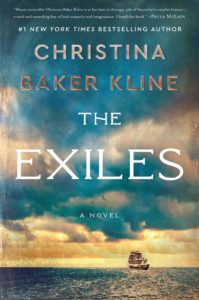Book Review
The Exiles
Rating:

If you enjoy historical fiction, I highly recommend The Exiles, the latest book by the author of Orphan Train and A Piece of the World: A Novel. I read the latter, and while this one is on an entirely different subject, it is every bit as interesting. Christina Baker Kline captures time and place with an authenticity that rivals the best of historical fiction writer.
A caveat here, though. The Exiles is a tough read. Set in the mid-1800s, the story centers on the brutal British practice of sending women accused of crimes to penal colonies in Australia. Most of these transported women will never see their homeland again, in part because of the distance to which they are sent, in part because they have no homes to which to return. These women are generally poor. Many are charged with petty crimes. One of the main characters is out-and-out framed.
The harrowing portrait of their lives – first in London’s Newgate Prison, then on a boat for months en route to Australia, and finally in Australia itself – is relentless. Again, I warn, this isn’t light fare. Bad things happen to the best of characters, and they happen again and again and again. Just when you think things have to improve, they get worse, so much so that I nearly set the book aside. I’m glad I didn’t, solely for the final positive twist at the end.
Three women from the core of The Exiles. Evangeline is educated and naïve, a governess who is impregnated and abandoned by the handsome son of her employer. Hazel is barely sixteen when she is sentenced to transportation for petty theft. And then there’s Mathinna, the orphaned daughter of an Aboriginal chief, who is in Australia all along but summarily removed from her tribe to be used as the subject of a powerful woman’s social experiment in taming and teaching the natives.
This book is beautifully written throughout, the research detailed, the characters ones for whom we deeply feel. And there is a lovely entwining of Hazel’s background as a midwife and herbalist with a major twist of the plot. These are all good things.
That said, the author calls this a project about feminism, but I didn’t see it that. I felt Evangeline was way too meek to be considered any kind of rebel. Sympathetic, she is. And she certainly is the catalyst for Hazel’s emergence. But a rebel making a mark on the future? No. The Exiles is more a story of women helping women in the bleakest of times. It does that remarkably well.
The most rebellious of the characters, the one who most fully breaks out, is Mathinna. But she … just … disappears. After being a major character for much of the book, one to whom the author returns for long stretches, she is dropped. Perhaps the medium is the message. I’ll have to go with that.
I’ve given this book four stars on the strength of the writing, the research, and those individual parts that enlightened.